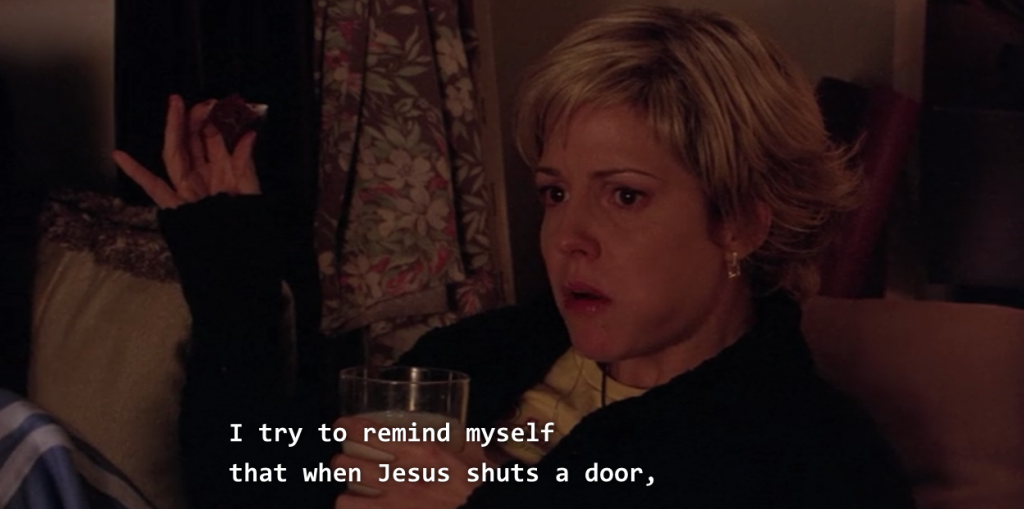I started this series in response to Addie Zierman’s original post on the 5 churchy phrases that are scaring off millennials. I agreed with her post, yet I didn’t think it went far enough. I wanted to take it further, to figure out exactly why these phrases are worse than mere clichés. They don’t just make us millennials roll our eyes…they repel us.
In writing these posts, I discovered something that surprised me: other generations don’t understand why millennials feel this way, and more importantly, they don’t understand why it matters. My husband, on the tail end of the Gen Xers, disagreed with me about a few posts. Where I saw a passive-aggressive insult, he saw a call to arms. If I use the responses I’ve gotten to make an alarmingly broad generalization, it seems that the older the person, the more they disagree, and the less they think it matters. “It” being, of course, that millennials hate these phrases.
The world has changed a lot in a little bit of time. When I was toddler, my parents had one phone that hung on the wall. I used to reach up and play with the twisty cord that connected the base and the reciever. Two and a half decades later, they each have Droids that double as computers, televisions, planners, barometers, and, oh yeah, phones. When I was a kid, you could get news from three sources: the newspaper, the television, and the radio. They all reported pretty much the same thing. Now, the news you hear depends on the news site you favor. Chances are good you didn’t even hear about the trial of Kermit Gosnell if you like your news to lean left. Chances are good you didn’t hear about the voter suppression scheme if you like your news to lean right. When I was a kid, if my mom had a health concern she called the pediatrician and got one answer. Now, we jump on Google and get one hundred.
For better or for worse, we’re not reassured when someone on NPR explains why there’s no problem whatsoever with the implementation of Obamacare. We’re not reassured when the pediatrician says Gardisil is safe, or when the FDA says to eat a grain-based diet, or when the ADA says flouride is, like, the best thing ever. We’ve seen too much fallout from the public being reassured into a false sense of safety. We have too much readily-available information to believe what someone says because they’re an authority. We are the product of a worldwide social and cultural experiment that still hasn’t stabilized. It may be disastrous, in the end, but it can’t be undone now, at least not for us. We may have been better off like previous generations, shielded by the limits of technology, communication, and distance from the horrors unfolding across the world, but we weren’t. We may have been better off being able to accept phrases like “God is always in control,” but we can’t. If you really want to understand millennials, if you really want to reach us where we are, you have to stop lamenting that we’re not more like the Boomers or the Gen X-ers. We aren’t, and we never will be. These phrases may not matter to you. You may think it’s no big deal and we need to chill out, but it’s a big deal to us, and if you really want to reach us millennials, you’ll make the effort to understand why.
The truth about millennials is that we don’t want to be pacified. We live in a world transformed by technology; we’ve grown up seeing disasters, tragedies, and genocides played out on the evening news almost in real time. We know what the world is like beyond our doors, and sentimental half-truths are not enough to answer our questions or assuage our doubts. Yet we don’t give in to nihilism. Addie put it best:
I hold within me both cynicism and hope. I left the church. I came back.
Here is what I can tell you about millennials: We grew up on easy answers, catchphrases and cliché, and if we’ve learned anything, it’s that things are almost always more complicated than that.
When I returned to church, it wasn’t because of great programs, alluring events or a really cool “café” set up in the foyer. I went back not because of what the church was doing, but rather in spite of it.
(Emphasis mine-read the rest here)
The hard questions don’t drive us from the church, they bring us back to it. What drives us away is asking hard questions and getting the rhetorical equivalent of a nightlight and a warm blankie in response. We don’t want, or need, to be comforted so that our faith doesn’t shatter. Our faith isn’t shattered when people say, “I don’t have the answer.” It’s shattered when people pretend they do. It’s shattered when people pretend there’s not even a question in the first place. In the end, I don’t even think we’re looking for The Answers, as if life is the ultimate SAT test. We’re not looking for someone to give us the scantron answer key, we’re looking for someone who’s willing to ask the hard questions with us. If you want to keep millennials from leaving the church or the Church, stop it with the coffee shops and pop-music concerts. You can’t sell us Jesus, and we know a sales pitch when we see one. Stop trying to make us feel good and just be honest.
To read Addie Zierman’s piece on the 5 churchy phrases that are scaring away millennials, go here:
5 churchy phrases that are scaring off millennials
To read the series I wrote in response about why these phrases scare away millennials, go here:
Part 1: The Bible Clearly Says...
Part II: God Will Never Give You More Than You Can Handle












